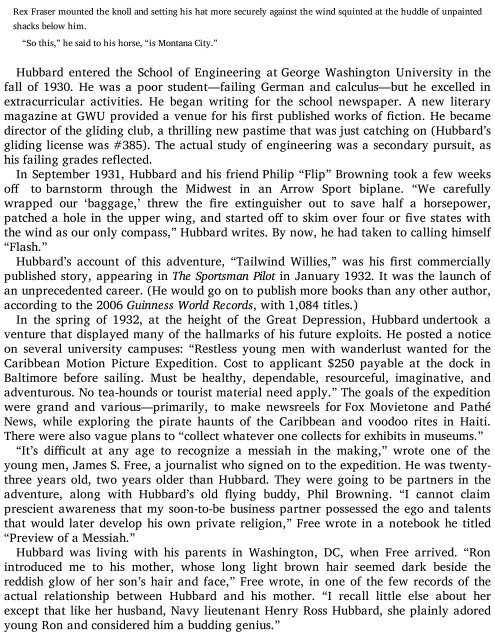going-clear-scientology-hollywood-and-the-prison-of-belief-by-lawrence-wright-2
going-clear-scientology-hollywood-and-the-prison-of-belief-by-lawrence-wright-2
going-clear-scientology-hollywood-and-the-prison-of-belief-by-lawrence-wright-2
You also want an ePaper? Increase the reach of your titles
YUMPU automatically turns print PDFs into web optimized ePapers that Google loves.
Rex Fraser mounted <strong>the</strong> knoll <strong>and</strong> setting his hat more securely against <strong>the</strong> wind squinted at <strong>the</strong> huddle <strong>of</strong> unpainted<br />
shacks below him.<br />
“So this,” he said to his horse, “is Montana City.”<br />
Hubbard entered <strong>the</strong> School <strong>of</strong> Engineering at George Washington University in <strong>the</strong><br />
fall <strong>of</strong> 1930. He was a poor student—failing German <strong>and</strong> calculus—but he excelled in<br />
extracurricular activities. He began writing for <strong>the</strong> school newspaper. A new literary<br />
magazine at GWU provided a venue for his rst published works <strong>of</strong> ction. He became<br />
director <strong>of</strong> <strong>the</strong> gliding club, a thrilling new pastime that was just catching on (Hubbard’s<br />
gliding license was #385). The actual study <strong>of</strong> engineering was a secondary pursuit, as<br />
his failing grades reflected.<br />
In September 1931, Hubbard <strong>and</strong> his friend Philip “Flip” Browning took a few weeks<br />
o to barnstorm through <strong>the</strong> Midwest in an Arrow Sport biplane. “We carefully<br />
wrapped our ‘baggage,’ threw <strong>the</strong> re extinguisher out to save half a horsepower,<br />
patched a hole in <strong>the</strong> upper wing, <strong>and</strong> started o to skim over four or ve states with<br />
<strong>the</strong> wind as our only compass,” Hubbard writes. By now, he had taken to calling himself<br />
“Flash.”<br />
Hubbard’s account <strong>of</strong> this adventure, “Tailwind Willies,” was his rst commercially<br />
published story, appearing in The Sportsman Pilot in January 1932. It was <strong>the</strong> launch <strong>of</strong><br />
an unprecedented career. (He would go on to publish more books than any o<strong>the</strong>r author,<br />
according to <strong>the</strong> 2006 Guinness World Records, with 1,084 titles.)<br />
In <strong>the</strong> spring <strong>of</strong> 1932, at <strong>the</strong> height <strong>of</strong> <strong>the</strong> Great Depression, Hubbard undertook a<br />
venture that displayed many <strong>of</strong> <strong>the</strong> hallmarks <strong>of</strong> his future exploits. He posted a notice<br />
on several university campuses: “Restless young men with w<strong>and</strong>erlust wanted for <strong>the</strong><br />
Caribbean Motion Picture Expedition. Cost to applicant $250 payable at <strong>the</strong> dock in<br />
Baltimore before sailing. Must be healthy, dependable, resourceful, imaginative, <strong>and</strong><br />
adventurous. No tea-hounds or tourist material need apply.” The goals <strong>of</strong> <strong>the</strong> expedition<br />
were gr<strong>and</strong> <strong>and</strong> various—primarily, to make newsreels for Fox Movietone <strong>and</strong> Pathé<br />
News, while exploring <strong>the</strong> pirate haunts <strong>of</strong> <strong>the</strong> Caribbean <strong>and</strong> voodoo rites in Haiti.<br />
There were also vague plans to “collect whatever one collects for exhibits in museums.”<br />
“It’s dicult at any age to recognize a messiah in <strong>the</strong> making,” wrote one <strong>of</strong> <strong>the</strong><br />
young men, James S. Free, a journalist who signed on to <strong>the</strong> expedition. He was twentythree<br />
years old, two years older than Hubbard. They were <strong>going</strong> to be partners in <strong>the</strong><br />
adventure, along with Hubbard’s old ying buddy, Phil Browning. “I cannot claim<br />
prescient awareness that my soon-to-be business partner possessed <strong>the</strong> ego <strong>and</strong> talents<br />
that would later develop his own private religion,” Free wrote in a notebook he titled<br />
“Preview <strong>of</strong> a Messiah.”<br />
Hubbard was living with his parents in Washington, DC, when Free arrived. “Ron<br />
introduced me to his mo<strong>the</strong>r, whose long light brown hair seemed dark beside <strong>the</strong><br />
reddish glow <strong>of</strong> her son’s hair <strong>and</strong> face,” Free wrote, in one <strong>of</strong> <strong>the</strong> few records <strong>of</strong> <strong>the</strong><br />
actual relationship between Hubbard <strong>and</strong> his mo<strong>the</strong>r. “I recall little else about her<br />
except that like her husb<strong>and</strong>, Navy lieutenant Henry Ross Hubbard, she plainly adored<br />
young Ron <strong>and</strong> considered him a budding genius.”


